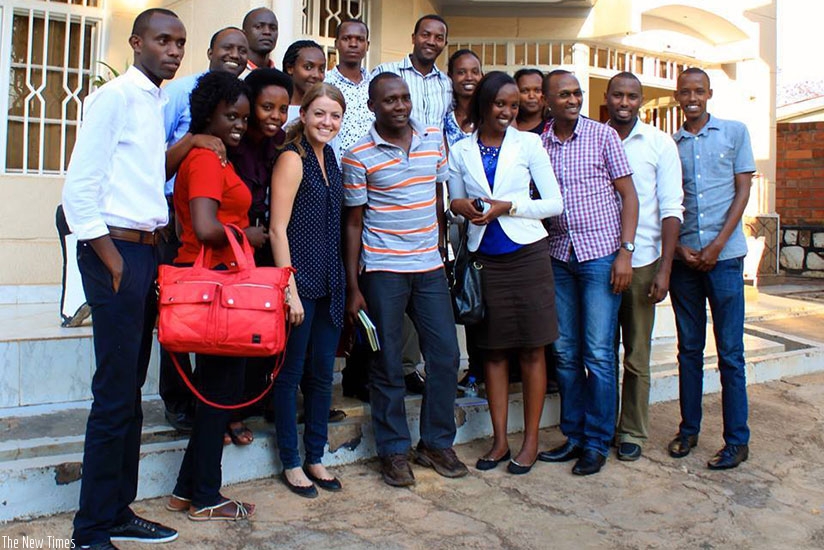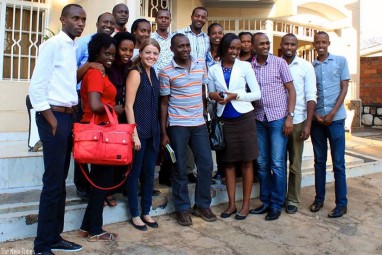
Psychosocial support essential for survivors to live productive lives.
In a few days from now, the country will once again for the 23rd time remember the 1994 genocide against the Tutsis. The killing of more than 1 million Tutsi caused many survivors to suffer psychological trauma either by witnessing the killing of their beloved ones or having to come to terms with growing up without family members. During this commemoration period, many survivors will revisit the past as they pay homage to victims. Unfortunately this period normally triggers symptoms of psychological trauma among many survivors.
Survivors Fund (SURF) works with Association of university student survivors of the genocide (AERG) to support youth survivors deal with unique challenges they face on a daily basis. In partnership with SURF, AERG helps youth survivors deal with trauma through counselling and legal assistance. Many of the members were very young at the time of the genocide and lost parents and their close family members. They had no legal rights to their family properties so relatives who took them in when their parents died also took ownership for their parents’ properties.

“Now that the children have become adults they need to have ownership of their parents’ property but some have faced serious challenges with their guardians who have refused to pass on the property. We help the students with necessary legal support that they need to acquire the property which is supposed to be theirs. At this youthful age, the students need advice and a lot of support to reassure them so that they can continue to concentrate on their studies,” said Jean Damascene Nsanzumuhire, the chief legal officer who works closely with the students in need of legal assistance.
A member of the student association, Damascene Nsanzumuhire has devoted himself to help fellow students and graduates. Like all the others, he lost many family members including his father. “Many times I remember my father but it is still difficult for me because although I know where he was killed together with others, I did not see his body. The last time I saw my dad was when we parted ways by the roadside while running away from genocidaires. I was only 10 years old at the time. Inspite of my suffering I try my best to concentrate on building a good future for myself and my family. I have worked very hard in my studies to honor the memory of my father,” Damascene said. Currently pursuing a legal diploma, Damascene has a Bachelor’s and Master’s degree in Law from the University of Rwanda. He is also married with one child.
With support from SURF and Inspire!africa, AERG also operates a toll free helpline (5576) where students can call from any part of the country and receive assistance. “We realized that it was important to create a way for the students to reach out for support. Many of them because of the legal issues they face, it is difficult for them to concentrate on their studies and future. Because of the legal challenges the students face, some have actually dropped out of school. However through this helpline, they can call and receive free legal advice on how to go about their legal battles and also advice on how to excel on their studies,” explained Damascene. Since its establishment in August 2013, the helpline has grown from a small pilot telephone based service to an innovative, all-encompassing legal and counseling support service.
Students can also call the helpline for counselling on issues that affect them as a result of the 1994 genocide against the Tutsis “Many young people during the commemoration period are hospitalized for two to three days due to the psychological trauma. They have a lot of flashback memories and we ensure that our helpline is open for students so that they can call and pour their hearts out as we listen and counsel them. It is important they have people that they can talk to at this time,” added Damascene.
Along the Helpline, with support from DFID through Survivors Fund, AERG is implementing an economic empowerment project for survivors school drop outs. The project provides business training and start up loans. This goes along with counselling sessions as it has been proved that for the youth affected by psychological trauma to effectively participate in business they need to be psychologically stable. The project also provides legal support to ensure that the beneficiaries are supported holistically.
While AERG is doing its best to provide the needed psychosocial support to survivors, the need is great and the resources are very limited. There are only a handful of psychological clinics in the country where AERG can refer critical cases which require professional psychiatric intervention especially for youth survivors living in very remote areas.
www.survivors-fund.org.uk
www.aerg.org.rw
As first published in The New Times on 27th March 2017.
